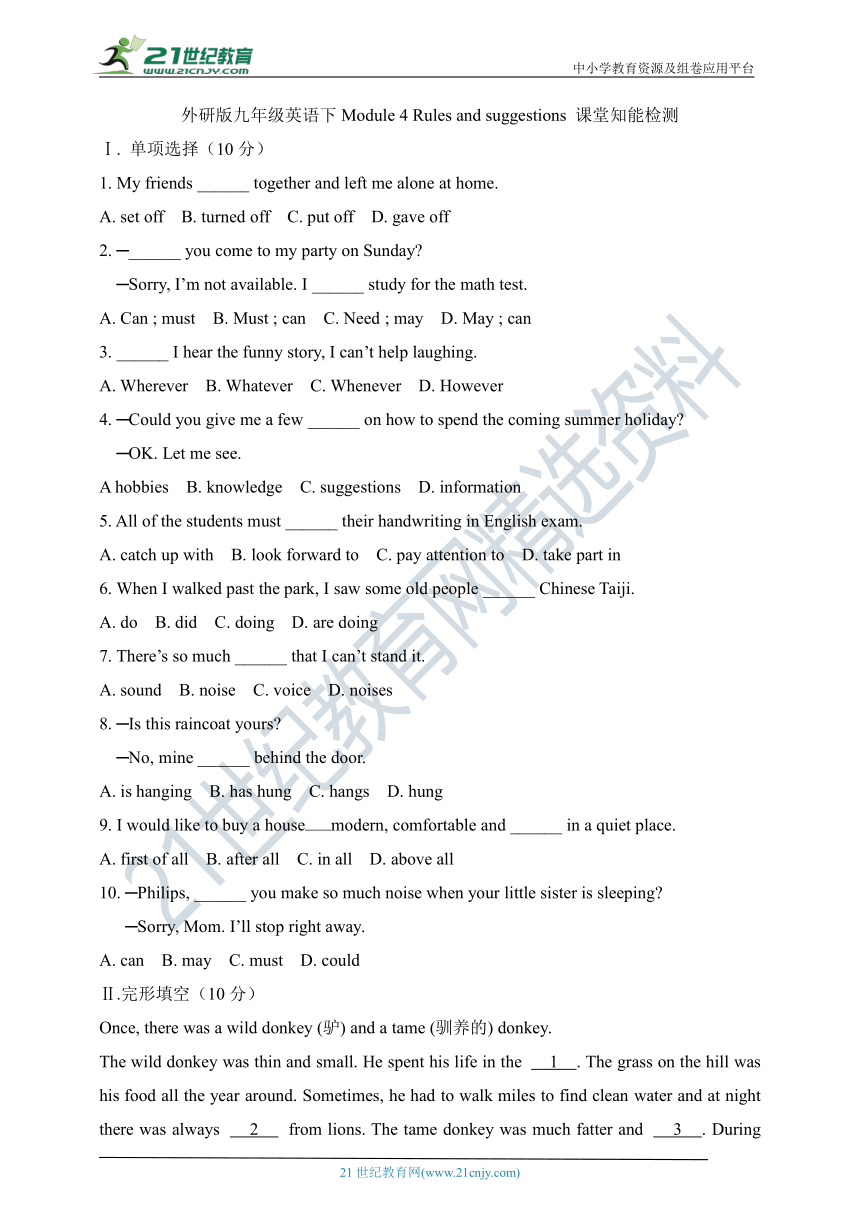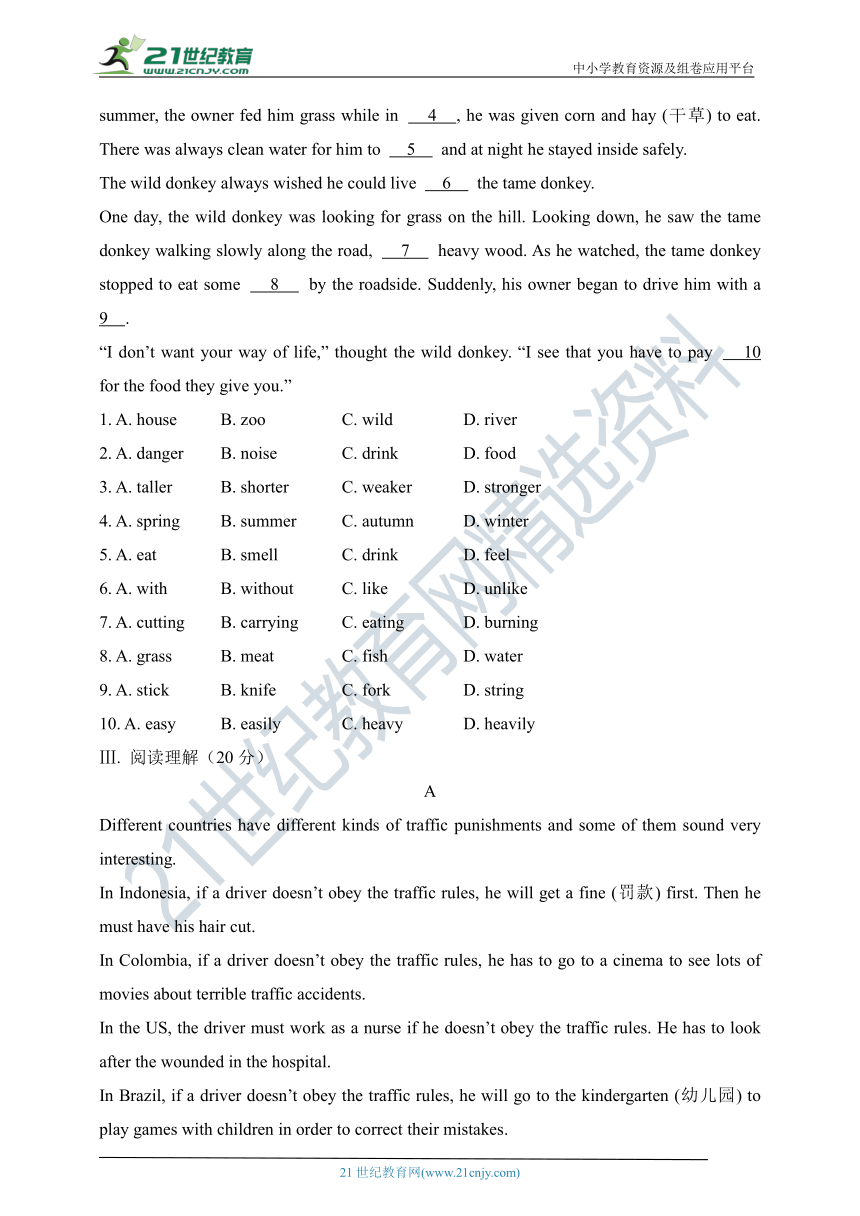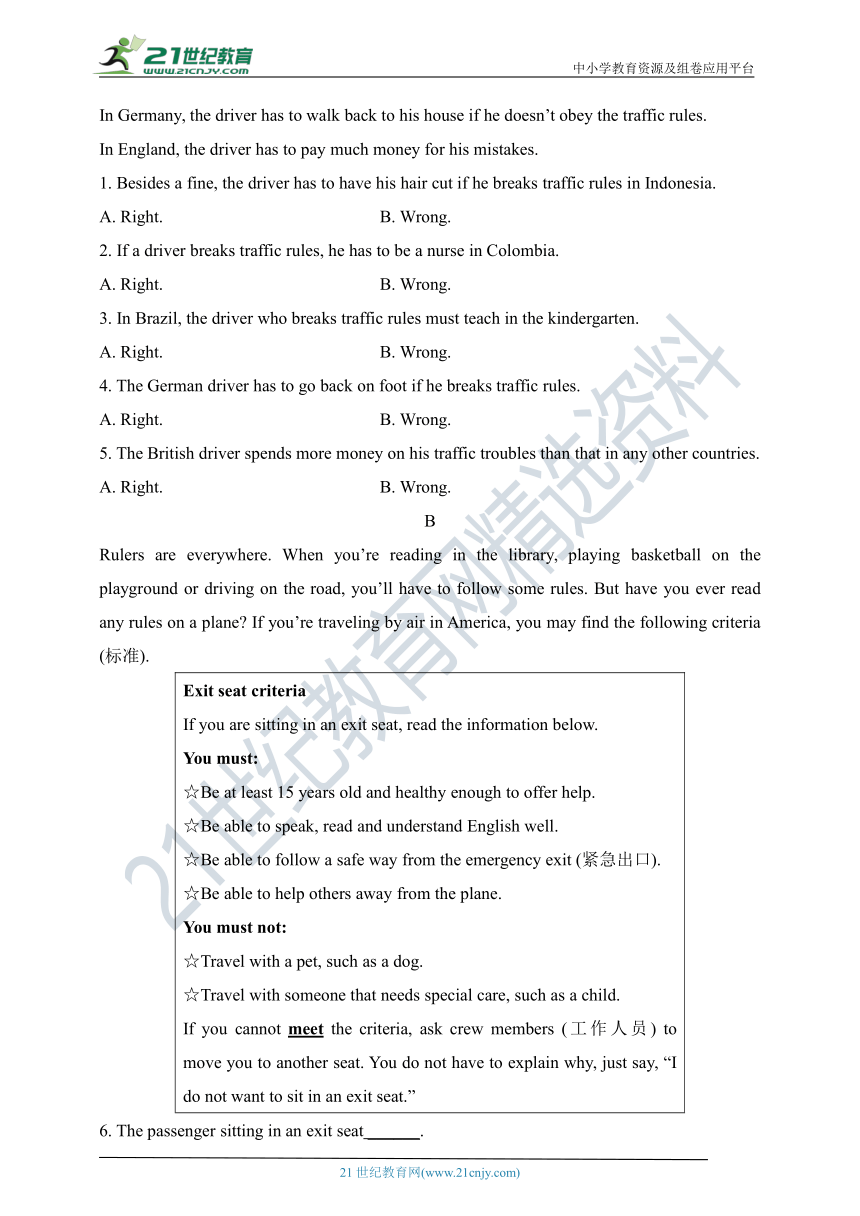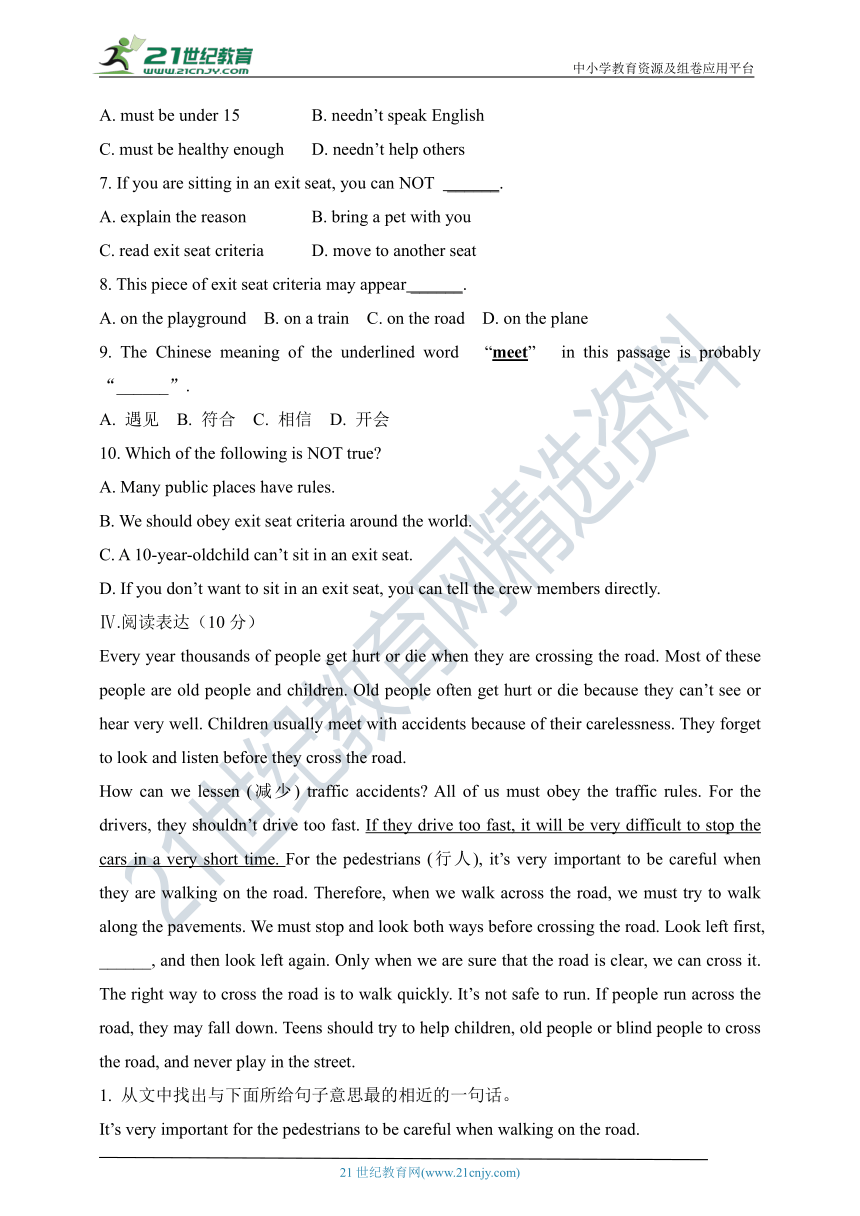Module 4 Rules and suggestions 课堂知能检测(有答案)
文档属性
| 名称 | Module 4 Rules and suggestions 课堂知能检测(有答案) |

|
|
| 格式 | doc | ||
| 文件大小 | 1.2MB | ||
| 资源类型 | 试卷 | ||
| 版本资源 | 外研版 | ||
| 科目 | 英语 | ||
| 更新时间 | 2021-02-20 17:52:53 | ||
图片预览




文档简介
中小学教育资源及组卷应用平台
外研版九年级英语下Module 4 Rules and suggestions 课堂知能检测
Ⅰ. 单项选择(10分)
1. My friends ______ together and left me alone at home.
A. set off B. turned off C. put off D. gave off
2. ─______ you come to my party on Sunday?
─Sorry, I’m not available. I ______ study for the math test.
A. Can ; must B. Must ; can C. Need ; may D. May ; can
3. ______ I hear the funny story, I can’t help laughing.
A. Wherever B. Whatever C. Whenever D. However
4. ─Could you give me a few ______ on how to spend the coming summer holiday?
─OK. Let me see.
A hobbies B. knowledge C. suggestions D. information
5. All of the students must ______ their handwriting in English exam.
A. catch up with B. look forward to C. pay attention to D. take part in
6. When I walked past the park, I saw some old people ______ Chinese Taiji.
A. do B. did C. doing D. are doing
7. There’s so much ______ that I can’t stand it.
A. sound B. noise C. voice D. noises
8. ─Is this raincoat yours?
─No, mine ______ behind the door.
A. is hanging B. has hung C. hangs D. hung
9. I would like to buy a house───modern, comfortable and ______ in a quiet place.
A. first of all B. after all C. in all D. above all
10. ─Philips, ______ you make so much noise when your little sister is sleeping?
─Sorry, Mom. I’ll stop right away.
A. can B. may C. must D. could
Ⅱ.完形填空(10分)
Once, there was a wild donkey (驴) and a tame (驯养的) donkey.
The wild donkey was thin and small. He spent his life in the 1 . The grass on the hill was his food all the year around. Sometimes, he had to walk miles to find clean water and at night there was always 2 from lions. The tame donkey was much fatter and 3 . During summer, the owner fed him grass while in 4 , he was given corn and hay (干草) to eat. There was always clean water for him to 5 and at night he stayed inside safely.
The wild donkey always wished he could live 6 the tame donkey.
One day, the wild donkey was looking for grass on the hill. Looking down, he saw the tame donkey walking slowly along the road, 7 heavy wood. As he watched, the tame donkey stopped to eat some 8 by the roadside. Suddenly, his owner began to drive him with a 9 .
揑 don抰 want your way of life, thought the wild donkey. 揑 see that you have to pay 10 for the food they give you.
1. A. house B. zoo C. wild D. river
2. A. danger B. noise C. drink D. food
3. A. taller B. shorter C. weaker D. stronger
4. A. spring B. summer C. autumn D. winter
5. A. eat B. smell C. drink D. feel
6. A. with B. without C. like D. unlike
7. A. cutting B. carrying C. eating D. burning
8. A. grass B. meat C. fish D. water
9. A. stick B. knife C. fork D. string
10. A. easy B. easily C. heavy D. heavily
Ⅲ. 阅读理解(20分)
A
Different countries have different kinds of traffic punishments and some of them sound very interesting.
In Indonesia, if a driver doesn’t obey the traffic rules, he will get a fine (罚款) first. Then he must have his hair cut.
In Colombia, if a driver doesn抰 obey the traffic rules, he has to go to a cinema to see lots of movies about terrible traffic accidents.
In the US, the driver must work as a nurse if he doesn抰 obey the traffic rules. He has to look after the wounded in the hospital.
In Brazil, if a driver doesn抰 obey the traffic rules, he will go to the kindergarten (幼儿园) to play games with children in order to correct their mistakes.
In Germany, the driver has to walk back to his house if he doesn’t obey the traffic rules.
In England, the driver has to pay much money for his mistakes.
1. Besides a fine, the driver has to have his hair cut if he breaks traffic rules in Indonesia.
A. Right. B. Wrong.
2. If a driver breaks traffic rules, he has to be a nurse in Colombia.
A. Right. B. Wrong.
3. In Brazil, the driver who breaks traffic rules must teach in the kindergarten.
A. Right. B. Wrong.
4. The German driver has to go back on foot if he breaks traffic rules.
A. Right. B. Wrong.
5. The British driver spends more money on his traffic troubles than that in any other countries.
A. Right. B. Wrong.
B
Rulers are everywhere. When you抮e reading in the library, playing basketball on the playground or driving on the road, you抣l have to follow some rules. But have you ever read any rules on a plane? If you抮e traveling by air in America, you may find the following criteria (标准).
Exit seat criteria If you are sitting in an exit seat, read the information below.
You must:
☆Be at least 15 years old and healthy enough to offer help.
☆Be able to speak, read and understand English well.
☆Be able to follow a safe way from the emergency exit (紧急出口).
☆Be able to help others away from the plane.
You must not:
☆Travel with a pet, such as a dog.
☆Travel with someone that needs special care, such as a child.
If you cannot meet the criteria, ask crew members (工作人员) to move you to another seat. You do not have to explain why, just say, “I do not want to sit in an exit seat.”
6. The passenger sitting in an?exit?seat?______.
A. must be under 15 B. needn’t speak English
C. must be healthy enough D. needn’t help others
7. If you are sitting in an exit爏eat, you can NOT 燺_____.
A. explain the reason B. bring a pet with you
C. read爀xit爏eat criteria D. move to another爏eat
8. This piece of爀xit seat criteria爉ay appear燺_____.
A. on the playground B. on a train C. on the road D. on the plane
9. The Chinese meaning of the underlined word 搈eet in this passage is probably 揰_____.
A. 遇见 B. 符合 C. 相信 D. 开会
10. Which of the following is NOT true?
A. Many public places have rules.
B. We should obey exit?seat criteria?around the world.
C. A 10-year-oldchild can’t sit in an exit seat.
D. If you don’t want to sit in an exit seat, you can tell the crew members directly.
Ⅳ.阅读表达(10分)
Every year thousands of people get hurt or die when they are crossing the road. Most of these people are old people and children. Old people often get hurt or die because they can’t see or hear very well. Children usually meet with accidents because of their carelessness. They forget to look and listen before they cross the road.
How can we lessen (减少) traffic accidents? All of us must obey the traffic rules. For the drivers, they shouldn’t drive too fast. If they drive too fast, it will be very difficult to stop the cars in a very short time. For the pedestrians (行人), it’s very important to be careful when they are walking on the road. Therefore, when we walk across the road, we must try to walk along the pavements. We must stop and look both ways before crossing the road. Look left first, ______, and then look left again. Only when we are sure that the road is clear, we can cross it. The right way to cross the road is to walk quickly. It’s not safe to run. If people run across the road, they may fall down. Teens should try to help children, old people or blind people to cross the road, and never play in the street.
1. 从文中找出与下面所给句子意思最的相近的一句话。
It’s very important for the pedestrians to be careful when walking on the road.
____________________________________________
2. 将第二段画线的英语句子翻译成汉语。
____________________________________________
3. Why do the old people often get hurt or die when they cross the road?
____________________________________________
4. 在文中第二段的空线处填入恰当的内容,使全句完整。
____________________________________________
5. What’s the main idea of the passage?
____________________________________________
Ⅴ.语法填空(10分)
On the first evening, the three of us were tired after walking for about eight hours. We soon 1.______ (fall) asleep. The next day, while the others were resting, I went for 2.______ (冠词) walk in the forest. Suddenly, I saw a baby bear 3.______ (play) with some sticks and stones. He looked so soft and 4.______ (friend), and I remembered thinking, “If I reach out, I can just touch 5.______ (he). There was a loud noise 6.______ (介词) me. I stood very still. I didn’t even turn my head. There was another loud noise. The baby bear looked up, 7.______ (连词) ran towards me. I turned pale and he ran past me into the woods. I was still 8.______ (介词) a few minutes. Then 9.______ (slow) I turned round. I ran back to my friends. I have never 10.______ ( run) so fast. For the next 10 days, every time there was sudden noise, my blood went cold.
Ⅵ.单词拼写(10分)
1. He killed the tiger with his ______ (枪).
2. When we go camping, we can sleep in the ______ (帐篷).
3. We can add some eggs to the cake to make it ______ (柔软的).
4. Please help me ______ (悬挂) the basket in the tree.
5. He cut his hand and ______ (血液) made his clothes red.
6. I didn’t ______ [f??l] asleep the whole night.
7. There are some beautiful birds in the ______ [wudz].
8. Remember you should wear the ______ ['pr?p?] shoes.
9. The girl is ______ ['sta:vi?]. Why not give her something to eat?
10. The bridge is made of ______ [st??nz].
Ⅶ.书面表达(10分)
1. 不要一下子喝掉你们所有的水。
2. 我如此害怕以至于我心惊胆战。
3. 李大明现在可能在家。
4. 你应该经常跟你父母谈谈。
5. 你千万不要把这件事告诉其他任何人。
参考答案
单项选择 1-5 AACCC 6-10 CBADC
完形填空 1-5 CADDC 6-10 CBAAD
阅读理解 1-5 ABBAB 6-10 CBDBB
阅读表达 1. For the pedestrians, it’s very important to be careful when they are walking on the road.
2. 如果他们驾驶得太快,将很难在非常短的时间内将车停下来。
3. Because they can’t see or hear very well.
4. next look right
5. How to lessen traffic accidents?
语法填空1.fell 2.a 3.playing 4.friendly 5.him 6.behind 7.and 8.for 9.slowly 10.run
单词拼写1.gun 2.tent 3.soft 4.hang 5.blood 6.fall 7.woods 8.proper 9.starving 10.stones
书面表达
1. Don’t drink all your water in one go.
2. I was so afraid that my blood went cold.
3. Li Daming may be at home now.
4. You should often talk to your parents.
5. You mustn’t tell it to anyone else.
_21?????????è?????(www.21cnjy.com)_
外研版九年级英语下Module 4 Rules and suggestions 课堂知能检测
Ⅰ. 单项选择(10分)
1. My friends ______ together and left me alone at home.
A. set off B. turned off C. put off D. gave off
2. ─______ you come to my party on Sunday?
─Sorry, I’m not available. I ______ study for the math test.
A. Can ; must B. Must ; can C. Need ; may D. May ; can
3. ______ I hear the funny story, I can’t help laughing.
A. Wherever B. Whatever C. Whenever D. However
4. ─Could you give me a few ______ on how to spend the coming summer holiday?
─OK. Let me see.
A hobbies B. knowledge C. suggestions D. information
5. All of the students must ______ their handwriting in English exam.
A. catch up with B. look forward to C. pay attention to D. take part in
6. When I walked past the park, I saw some old people ______ Chinese Taiji.
A. do B. did C. doing D. are doing
7. There’s so much ______ that I can’t stand it.
A. sound B. noise C. voice D. noises
8. ─Is this raincoat yours?
─No, mine ______ behind the door.
A. is hanging B. has hung C. hangs D. hung
9. I would like to buy a house───modern, comfortable and ______ in a quiet place.
A. first of all B. after all C. in all D. above all
10. ─Philips, ______ you make so much noise when your little sister is sleeping?
─Sorry, Mom. I’ll stop right away.
A. can B. may C. must D. could
Ⅱ.完形填空(10分)
Once, there was a wild donkey (驴) and a tame (驯养的) donkey.
The wild donkey was thin and small. He spent his life in the 1 . The grass on the hill was his food all the year around. Sometimes, he had to walk miles to find clean water and at night there was always 2 from lions. The tame donkey was much fatter and 3 . During summer, the owner fed him grass while in 4 , he was given corn and hay (干草) to eat. There was always clean water for him to 5 and at night he stayed inside safely.
The wild donkey always wished he could live 6 the tame donkey.
One day, the wild donkey was looking for grass on the hill. Looking down, he saw the tame donkey walking slowly along the road, 7 heavy wood. As he watched, the tame donkey stopped to eat some 8 by the roadside. Suddenly, his owner began to drive him with a 9 .
揑 don抰 want your way of life, thought the wild donkey. 揑 see that you have to pay 10 for the food they give you.
1. A. house B. zoo C. wild D. river
2. A. danger B. noise C. drink D. food
3. A. taller B. shorter C. weaker D. stronger
4. A. spring B. summer C. autumn D. winter
5. A. eat B. smell C. drink D. feel
6. A. with B. without C. like D. unlike
7. A. cutting B. carrying C. eating D. burning
8. A. grass B. meat C. fish D. water
9. A. stick B. knife C. fork D. string
10. A. easy B. easily C. heavy D. heavily
Ⅲ. 阅读理解(20分)
A
Different countries have different kinds of traffic punishments and some of them sound very interesting.
In Indonesia, if a driver doesn’t obey the traffic rules, he will get a fine (罚款) first. Then he must have his hair cut.
In Colombia, if a driver doesn抰 obey the traffic rules, he has to go to a cinema to see lots of movies about terrible traffic accidents.
In the US, the driver must work as a nurse if he doesn抰 obey the traffic rules. He has to look after the wounded in the hospital.
In Brazil, if a driver doesn抰 obey the traffic rules, he will go to the kindergarten (幼儿园) to play games with children in order to correct their mistakes.
In Germany, the driver has to walk back to his house if he doesn’t obey the traffic rules.
In England, the driver has to pay much money for his mistakes.
1. Besides a fine, the driver has to have his hair cut if he breaks traffic rules in Indonesia.
A. Right. B. Wrong.
2. If a driver breaks traffic rules, he has to be a nurse in Colombia.
A. Right. B. Wrong.
3. In Brazil, the driver who breaks traffic rules must teach in the kindergarten.
A. Right. B. Wrong.
4. The German driver has to go back on foot if he breaks traffic rules.
A. Right. B. Wrong.
5. The British driver spends more money on his traffic troubles than that in any other countries.
A. Right. B. Wrong.
B
Rulers are everywhere. When you抮e reading in the library, playing basketball on the playground or driving on the road, you抣l have to follow some rules. But have you ever read any rules on a plane? If you抮e traveling by air in America, you may find the following criteria (标准).
Exit seat criteria If you are sitting in an exit seat, read the information below.
You must:
☆Be at least 15 years old and healthy enough to offer help.
☆Be able to speak, read and understand English well.
☆Be able to follow a safe way from the emergency exit (紧急出口).
☆Be able to help others away from the plane.
You must not:
☆Travel with a pet, such as a dog.
☆Travel with someone that needs special care, such as a child.
If you cannot meet the criteria, ask crew members (工作人员) to move you to another seat. You do not have to explain why, just say, “I do not want to sit in an exit seat.”
6. The passenger sitting in an?exit?seat?______.
A. must be under 15 B. needn’t speak English
C. must be healthy enough D. needn’t help others
7. If you are sitting in an exit爏eat, you can NOT 燺_____.
A. explain the reason B. bring a pet with you
C. read爀xit爏eat criteria D. move to another爏eat
8. This piece of爀xit seat criteria爉ay appear燺_____.
A. on the playground B. on a train C. on the road D. on the plane
9. The Chinese meaning of the underlined word 搈eet in this passage is probably 揰_____.
A. 遇见 B. 符合 C. 相信 D. 开会
10. Which of the following is NOT true?
A. Many public places have rules.
B. We should obey exit?seat criteria?around the world.
C. A 10-year-oldchild can’t sit in an exit seat.
D. If you don’t want to sit in an exit seat, you can tell the crew members directly.
Ⅳ.阅读表达(10分)
Every year thousands of people get hurt or die when they are crossing the road. Most of these people are old people and children. Old people often get hurt or die because they can’t see or hear very well. Children usually meet with accidents because of their carelessness. They forget to look and listen before they cross the road.
How can we lessen (减少) traffic accidents? All of us must obey the traffic rules. For the drivers, they shouldn’t drive too fast. If they drive too fast, it will be very difficult to stop the cars in a very short time. For the pedestrians (行人), it’s very important to be careful when they are walking on the road. Therefore, when we walk across the road, we must try to walk along the pavements. We must stop and look both ways before crossing the road. Look left first, ______, and then look left again. Only when we are sure that the road is clear, we can cross it. The right way to cross the road is to walk quickly. It’s not safe to run. If people run across the road, they may fall down. Teens should try to help children, old people or blind people to cross the road, and never play in the street.
1. 从文中找出与下面所给句子意思最的相近的一句话。
It’s very important for the pedestrians to be careful when walking on the road.
____________________________________________
2. 将第二段画线的英语句子翻译成汉语。
____________________________________________
3. Why do the old people often get hurt or die when they cross the road?
____________________________________________
4. 在文中第二段的空线处填入恰当的内容,使全句完整。
____________________________________________
5. What’s the main idea of the passage?
____________________________________________
Ⅴ.语法填空(10分)
On the first evening, the three of us were tired after walking for about eight hours. We soon 1.______ (fall) asleep. The next day, while the others were resting, I went for 2.______ (冠词) walk in the forest. Suddenly, I saw a baby bear 3.______ (play) with some sticks and stones. He looked so soft and 4.______ (friend), and I remembered thinking, “If I reach out, I can just touch 5.______ (he). There was a loud noise 6.______ (介词) me. I stood very still. I didn’t even turn my head. There was another loud noise. The baby bear looked up, 7.______ (连词) ran towards me. I turned pale and he ran past me into the woods. I was still 8.______ (介词) a few minutes. Then 9.______ (slow) I turned round. I ran back to my friends. I have never 10.______ ( run) so fast. For the next 10 days, every time there was sudden noise, my blood went cold.
Ⅵ.单词拼写(10分)
1. He killed the tiger with his ______ (枪).
2. When we go camping, we can sleep in the ______ (帐篷).
3. We can add some eggs to the cake to make it ______ (柔软的).
4. Please help me ______ (悬挂) the basket in the tree.
5. He cut his hand and ______ (血液) made his clothes red.
6. I didn’t ______ [f??l] asleep the whole night.
7. There are some beautiful birds in the ______ [wudz].
8. Remember you should wear the ______ ['pr?p?] shoes.
9. The girl is ______ ['sta:vi?]. Why not give her something to eat?
10. The bridge is made of ______ [st??nz].
Ⅶ.书面表达(10分)
1. 不要一下子喝掉你们所有的水。
2. 我如此害怕以至于我心惊胆战。
3. 李大明现在可能在家。
4. 你应该经常跟你父母谈谈。
5. 你千万不要把这件事告诉其他任何人。
参考答案
单项选择 1-5 AACCC 6-10 CBADC
完形填空 1-5 CADDC 6-10 CBAAD
阅读理解 1-5 ABBAB 6-10 CBDBB
阅读表达 1. For the pedestrians, it’s very important to be careful when they are walking on the road.
2. 如果他们驾驶得太快,将很难在非常短的时间内将车停下来。
3. Because they can’t see or hear very well.
4. next look right
5. How to lessen traffic accidents?
语法填空1.fell 2.a 3.playing 4.friendly 5.him 6.behind 7.and 8.for 9.slowly 10.run
单词拼写1.gun 2.tent 3.soft 4.hang 5.blood 6.fall 7.woods 8.proper 9.starving 10.stones
书面表达
1. Don’t drink all your water in one go.
2. I was so afraid that my blood went cold.
3. Li Daming may be at home now.
4. You should often talk to your parents.
5. You mustn’t tell it to anyone else.
_21?????????è?????(www.21cnjy.com)_
同课章节目录
- Module 1 Travel
- Unit 1 We toured the city by bus and by taxi
- Unit 2 It's a long story.
- Unit 3 Language in use
- Module 2 Education
- Unit 1 They don't sit in rows.
- Unit 2 What do I like best about school?
- Unit 3 Language in use
- Module 3 Life now and then
- Unit 1 They sometimes work harder.
- Unit 2 I think life is better today.
- Unit 3 Language in use.
- Module 4 Rules and suggestions
- Unit 1 You must be careful of falling stones.
- Unit 2 we must keep the camp clean.
- Unit 3 Language in use.
- Revison A
- Module 5 Look after yourself
- Unit 1 We'd better get you to hospital.
- Unit 2 Get off the sofa!
- Unit 3 Language in use.
- Module 6 Eating togethe
- Unit 1 When is the school-leavers' party?
- Unit 2 Knives and forks are used for most Western
- Unit 3 Language in use
- Module 7 English for you and me
- Unit 1 Have you ever been to an English corner?
- Unit 2 We all own English.
- Unit 3 Language in use
- Module 8 My future life
- Unit 1 Here's to our friendship and the future
- Unit 2 I know that you will be better at maths.
- Unit 3 Language in use
- Revison B
